Disability hockey: Meet the players who won gold for England at the Euro Para-Hockey Championships
- Published
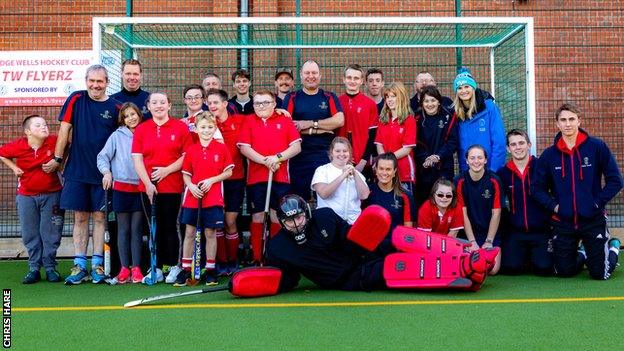
Tunbridge Wells Hockey Club have run a training session for disabled hockey players every fortnight since autumn 2017
Children running around, practising shots, v-drags and reverse stick hits as their parents watch on from the sidelines. These are the familiar sights at any hockey club across the nation.
But, in a picturesque corner of Kent, this is a training session like no other, as a small child with learning disabilities receives a push pass from a boy in an electric wheelchair.
"That's my son Oliver, he's probably the main catalyst for getting this all started," says one of the coaches Matthew Cawsey, pointing to an eight-year-old who runs after a loose ball.
"We'd spoken to a lot of sports clubs and they'd say, 'Yes we're inclusive'. But in reality they'd go, 'well you can join in, but there's no special provisions'. He has Down's syndrome; he needs to be told what direction to run in."
In autumn 2017, Tunbridge Wells Hockey Club founded their Flyerz section, with support from charity Access Sport and England Hockey, to encourage clubs to include disabled young people.
"You speak to all these parents and every one of them is just absolutely delighted there's something for their kids to be able to come and do in a normal way, because that doesn't exist elsewhere," adds Matthew, gesturing to an artificial pitch packed with players.
"There were kids who came here and they'd never speak or look at anyone. Now they're shouting at their team-mates for the ball. It's hockey but, it's not about the hockey. Plus, I get to play with my son; he gets to play with his dad. It's brilliant."
European champions
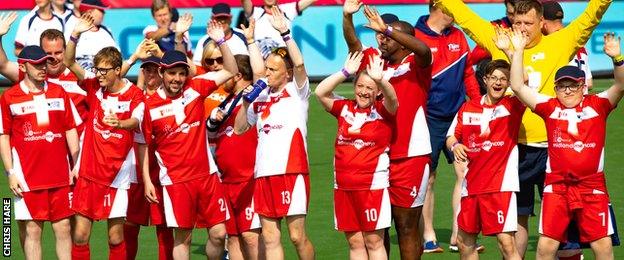
A UK Lions team - made up of players from four Flyerz clubs nationwide - beat an England side 2-0 in the Euro Para-Hockey Championships final
For a select few, there is a chance to represent their country and enjoy international success. In August, Flyerz sides representing England and the UK Lions reached the final of the Euro Para-Hockey Championships in Belgium, with the Lions taking the gold medal match 2-0.
"It was really good," shouts Frazer Hare, who played in goal for England in all the qualifying matches and outfield in the final.
The 18-year-old has a chromosome disorder which gives him a short stature and affects his cognitive and physical development.
"It wasn't about the winning," adds Frazer's dad Chris, an avid photographer from the sidelines. "I know it's a cliché and everyone says that, but in this type of squad, it doesn't matter.
"It was an awesome experience. Frazer's got mobility issues, so for him - moving around a hockey pitch - we didn't really dream he'd ever do that to be honest with you."
An inclusive bunch
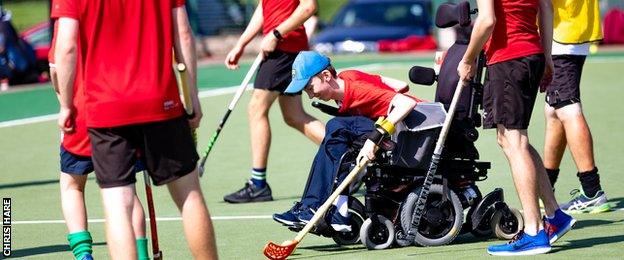
Will Pratten plays hockey with a stick built by his father as a regular hockey stick is too heavy for him to lift
For some players, just taking part is in itself a staggering achievement. Will Pratten races by in his motorised wheelchair; the 18-year-old has an undiagnosed condition affecting his muscle tone, which means a standard hockey stick would be too difficult for him to lift.
"I think we're on design number seven now," says his dad Alan, who built Will his own custom stick.
"The last one he had used an old fishing rod with a plastic head at the end. The current design uses a knee brace that straps a wooden pole to his lower arm and then at the bottom we've taped on some old halves of plastic bottles so he can scoop up the ball."
Flyerz Hockey's inclusivity is its greatest strength, with coaches happy to give specialised training to suit every player's needs.
"Nobody's ever picked last here. For Will, putting on the team kit is so crucial," adds Alan. "For a lot of the players, if they didn't have these sessions, they'd be so isolated."
It's a similar story for 10-year-old Samuel Wilson who receives some one-on-one coaching in a secluded corner.
Samuel has autism as well as coordination issues. But, since training with Flyerz, his concentration has improved.
"Last Christmas, I took the family to play mini golf," says his dad Will. "We'd never had him attend for the whole course before. He was suddenly trying to hockey it around the golf course.
"He has a little brother, who now plays hockey, and anything they can do together, if there's a game to play, as a parent, it's great."
The history makers
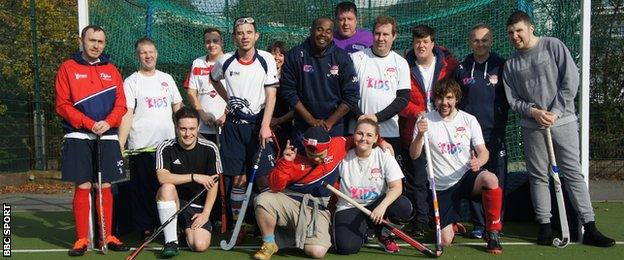
Midland Mencap Flyerz represented England at the Euro Para-Hockey Championships in 2015 and 2017, and sent 12 players to the tournament in 2019
Meanwhile, 170 miles north in Sutton Coldfield, at a Midland Mencap Flyerz training session, a last-minute equaliser is passionately celebrated by both the bibs and non-bibs.
"There's a huge social element to it all. You can see the characters and the camaraderie, there's a real sense of joy," says Midland Mencap head coach Steve Bradley.
Attached to a learning disability charity rather than a local hockey club, Midland Mencap made history at the 2015 Euro Para-Hockey European Championships in London, when they became the first team of adults with learning disabilities to represent England in a recognised tournament.
Two years later they won gold at the championships in Amsterdam, with Olympic champions Helen and Kate Richardson-Walsh presenting their medals.
Reece Brackpool, who has multiple learning disabilities, was named England captain for the 2019 tournament.
"A long time ago I played for a (mainstream) hockey club, but I didn't enjoy that, the people weren't too friendly," says Reece, 26, who has recently found part-time employment thanks to the skills he has picked up at Midland Mencap.
"I like it here though; I've made lots of new friends."
A family like no other
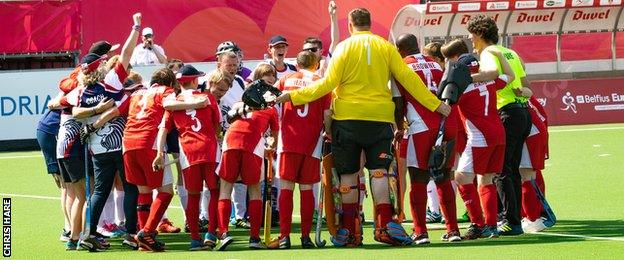
Flyerz clubs crowdfunded £1,627 to go towards travel costs and tournament entrance fees
As the players complete their warm down, Reece offers a high-five to his coach, only to mischievously lower his hand before any contact can be made. He stands with a proud grin.
"Hockey gives you the family you may not have had. I look forward to every session," says his team-mate Tom Kirby, who suffers from multiple learning disabilities as well as having a visual impairment.
Like many of his team-mates Tom, 28, is a two-time gold medal winner and since playing Flyerz Hockey has hosted a podcast, talked at Birmingham Town Hall and signed up for next year's London Marathon.
The squad radiates warmth, with any new player immediately struck by their affability.
"About a year ago I couldn't do groups or anything more than two or three people, I'd just shake and stutter," says Aston Villa fan Amy Turner, 23, who suffers from social anxiety and depression.
"Some people suggested it might help if I came down to a few training sessions. I'd never picked up a hockey stick in my life before. It's been brilliant. Now I'm going to all the Villa home games, sitting with 40,000 other people every week."
Head coach Steve looks on as the final cones and remaining hockey balls are packed away.
"A lot of the players have been told they'd never do that well in sports or that team sports are off limits to them," he concludes. "Those who think that couldn't be more wrong."